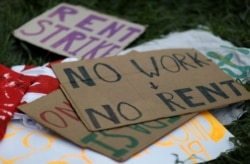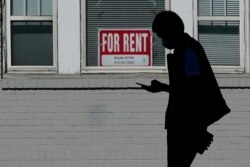Millions of Americans who fell behind on home rental payments during the pandemic lost federal protections against eviction on Monday, as a moratorium put in place by the Centers for Disease Control and Prevention (CDC) expired. But whether or not that will result in a wave of evictions remains unclear.
By some estimates, about 15 million Americans live in households that are behind on their rent payments, and housing activists say they are worried that many of them may find themselves homeless over the coming months, as states and municipalities restart the cumbersome process of evicting delinquent renters.
However, advocates for landlords say fears of a huge wave of evictions are overblown, pointing out that the time and expense associated with taking legal action to force someone from their home is onerous enough that landlords only choose that option as a last resort.
Federal aid stalled
Whether the coming number of evictions is large or more moderate, renters and property owners remain frustrated that a federal effort to make evictions unnecessary has stalled.
More than $45 billion in relief was approved by Congress in two tranches earlier this year, with the aim that the money would be delivered to state and local governments, which would then disburse it to renters in need. The funds are meant to cover back rent, and as much as three months of front rent, to allow renters to get back on their feet financially.
The amount of money Congress approved is enough to cover a huge percentage of delinquent rent payments, experts say. However, states and localities have largely failed to put systems in place to distribute the money, meaning that the aid has been extremely slow in arriving.
"It's so frustrating when all the money is there to pay people's back rent to keep landlords whole, to keep people in their homes," said Shamus Roller, executive director of the National Housing Law Project. "And yet, here we go. We're jumping off this cliff, and we just don't have to."
No action from Congress, White House
Frustration with the federal government extends far beyond the slow-moving relief program. The expiration date of the CDC's moratorium was known far in advance, and a Supreme Court ruling earlier this summer made it plain that only an act of Congress would be sufficient to extend it.
However, Democrats in the House of Representatives adjourned last week without acting on the moratorium — something that angered some of the party's more progressive members.
Congresswoman Cori Bush, who has personally experienced homelessness, has spent days camping on the steps of the Capitol to protest the lack of action from the party's leadership.
House Speaker Nancy Pelosi has pressed the White House to take unilateral action to extend the moratorium, which administration officials have repeatedly said they do not have the legal authority to do.
The lack of federal action has pushed some states and localities to impose eviction moratoriums of their own, so renters in some states, such as New York and California, remain protected. However, in many states, particularly in the Deep South, no such action has been taken.
Numbers unclear
Roller said that the number of people who might be facing eviction over the coming months is very difficult to estimate because there is no definitive source of data on rent delinquencies.
"It's hard to know, in practice, how many people are behind on their rent and how many of those will translate into evictions," he said. "That being said, there are many people who were being protected by the CDC order before it expired. So, there are real concerns about what that means in practice."
Roller said his best guess is that "we're going to see in excess of at least an extra million evictions over the next couple of months."
He pointed out that the rate of increase in evictions will depend in large part on how effective the CDC's moratorium was in the first place. Courts in different parts of the country interpreted the rules differently, resulting in a cease of evictions in some places while continuing in others at a near-normal pace.
Landlords also struggling
While much of the coverage of the eviction moratorium has focused on the people likely to lose their homes, advocates for property owners point out that landlords have also been placed under extreme financial pressure by the pandemic.
Estimates of how much landlords have lost in unpaid rentals since the coronavirus pandemic began range from $25 billion to far more than the $45.5 billion authorized by Congress to assist renters.
A large percentage of landlords in the U.S. are individual investors who own one or at most a handful of properties that they count on to produce regular income, and in some cases, to fund their retirement.
"This is truly the independent rental owner — the person who has put money in real estate for their retirement versus putting it in the stock market," said Bob Pinnegar, president and CEO of the National Apartment Association. "And so, this is the group that's been hit the hardest."
Pinnegar said since the start of the pandemic, nearly one in four property owners who rent single-family homes have been forced to sell one or more of their properties.
"If we're beginning to see those properties sold, it concerns me, because it indicates that these people are in true financial hardship," he said.
Evictions a last resort
Property owner advocates say that while there will be an increase in evictions with the lifting of the moratorium, the predictions of a huge surge are inaccurate.
"What has really been frustrating is this idea that if the eviction moratorium ends, suddenly, there's going to be this huge onslaught of evictions. That's just not the case," said Charles Tassell, CEO of the National Real Estate Investors Association.
"The deadline is a great motivator," Tassell said, suggesting that now that the possibility of eviction is more real, delinquent renters will be more likely to take advantage of various programs in place to provide rental assistance, from the slow-moving federal process to special assistance funds created at the state and local levels.
Pinnegar said landlords generally try to avoid evictions, if possible.
"An eviction is an action of last resort to regain possession of the property," he said. "That's a time-consuming process. From the time that process begins, until you get the property ready to be rented again, you can lose four months of rent. So, if there's an opportunity to work with your residents and get rental assistance ... it doesn't make financial sense not to work with the residents."
A new health crisis?
The original CDC moratorium was put in place as a public health measure to prevent people who were being asked to lock down at home from being forced into crowded shelters. That it has expired just as the delta variant of the coronavirus is surging nationally was not lost on activists.
"During a pandemic, a wave of evictions isn't just a housing crisis, it's also a public health crisis," Alicia Mazzara, a senior research analyst at the Center on Budget and Policy Priorities, said in an emailed statement. "This risk falls heavily on people of color, particularly Black and Latino communities, who face greater risk of eviction and more barriers to vaccination."
"States and localities can and should establish their own moratoriums to prevent a wave of evictions and slow the spread of COVID, and should move quickly to provide emergency rental assistance to those who need it," she added.







